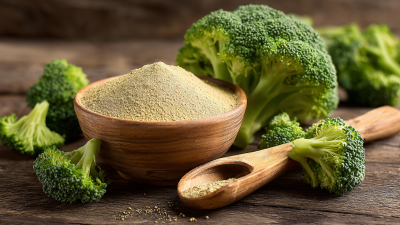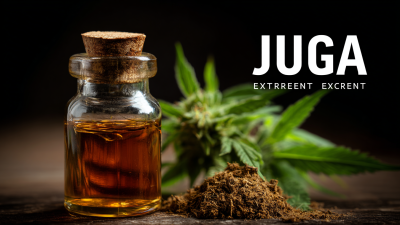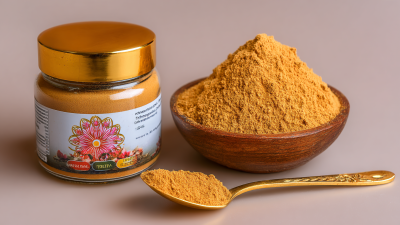Problems with Sourcing Quality Berberine Extract Powder for Global Buyers
Sourcing high-quality Berberine Extract Powder has emerged as a significant challenge for global buyers, especially given the increasing demand for natural health supplements.
According to a report by Grand View Research, the global dietary supplement market is projected to reach USD 230.73 billion by 2027, with a notable surge in interest towards herbal products like berberine due to its potential health benefits, including blood sugar regulation and cholesterol-lowering properties.
However, this rising demand presents a dilemma, as many suppliers struggle to meet the stringent quality standards expected by consumers and regulatory bodies alike.
Additionally, various studies indicate that the effectiveness of Berberine Extract Powder can vary greatly based on its purity and extraction methods, underscoring the importance of rigorous sourcing practices.
As buyers navigate this complex landscape, understanding the key issues in sourcing quality berberine becomes crucial to ensuring product efficacy and consumer safety.

Challenges in Ensuring Consistent Quality in Berberine Extract Sourcing Globally
Sourcing quality berberine extract powder presents significant challenges for global buyers, primarily due to variations in sourcing methods and standards among suppliers. One of the foremost issues is the lack of uniformity in the extraction processes utilized by different manufacturers. Some may use advanced extraction techniques that yield a higher purity product, while others may rely on less sophisticated methods, resulting in a compromise in quality. This inconsistency can lead to significant variations in the efficacy and safety of the final products offered to consumers.
Furthermore, the geographic origins of berberine can greatly impact the quality of the extract. Factors such as soil conditions, climate, and cultivation practices in different regions contribute to the active components present in berberine. Additionally, regulatory discrepancies across countries complicate the situation, as not all suppliers are held to the same quality control measures. Buyers must navigate these complexities carefully, ensuring that they conduct thorough due diligence and partner with reputable suppliers who can provide consistent product quality backed by reliable testing and certifications.

Impact of Sourcing Locations on Berberine Extract Purity and Potency
When sourcing quality berberine extract powder, the location of suppliers can significantly affect the purity and potency of the final product. Research indicates that berberine sourced from regions like China, which is known for its rich biodiversity and traditional herbal practices, often boasts higher alkaloid concentrations. For instance, a study by the Journal of Ethnopharmacology found that berberine extracted from plants grown in certain geographic areas yielded up to 97% purity, compared to only 75% from less controlled environments.
Choosing the right supplier is crucial for global buyers. Suppliers in regions with stringent quality controls and certifications are likely to deliver superior products. Look for suppliers that perform comprehensive testing on their extracts, including HPLC (High-Performance Liquid Chromatography) analysis, which ensures consistency in potency.
**Tips:** When evaluating potential suppliers, request their Certificate of Analysis (COA) and inquire about their sourcing practices. It's also advisable to seek those who engage in sustainable harvesting methods, as this not only supports environmental health but can also correlate with better quality extracts by preserving the natural habitats where berberine-rich plants thrive.
Regulatory Compliance Issues Affecting Global Distribution of Berberine Extract
Sourcing high-quality Berberine extract powder is increasingly challenging for global buyers, particularly due to the complex landscape of regulatory compliance. According to a report published by Market Research Future, the global market for dietary supplements containing Berberine is projected to reach approximately $3.2 billion by 2025. However, as demand surges, manufacturers face strict regulations from various health authorities, including the FDA and EFSA, aimed at ensuring product safety and efficacy. These regulations can differ significantly across regions, creating barriers that complicate the export and import processes for Berberine extract.
Furthermore, the lack of standardized testing protocols adds to the compliance challenges. The World Health Organization (WHO) has emphasized the need for standardized methods to evaluate herbal products, but many manufacturers still fail to adhere to these guidelines. A study by the Journal of Ethnopharmacology has shown that around 30% of herbal products tested do not meet quality specifications. As a result, global buyers must navigate a maze of compliance issues, often encountering discrepancies in product quality and potency. This situation not only affects their supply chains but also impacts consumer trust in Berberine as a reliable health supplement.
Market Dynamics: Price Fluctuations and Their Influence on Berberine Quality
Navigating the global marketplace for quality Berberine extract powder can be onerous due to varying price fluctuations that significantly impact product quality. In recent years, the berberine market has faced considerable volatility, influenced by changes in sourcing regions and the regulatory environment. As the demand for herbal supplements rises, especially among health-conscious consumers, manufacturers are often compelled to adjust their prices. These adjustments not only reflect the costs of raw materials but also the investments in ensuring product quality and compliance with international standards.

According to industry reports, the global market dynamics surrounding herbal extracts have seen significant shifts, similar to trends in other sectors. For instance, the global value of the newly emerging glycerin market is expected to reach approximately $1.3277 billion in 2024, with a compound annual growth rate (CAGR) projected at around 3.7% from 2025 to 2032. This trend highlights the increasing interest in natural products and their derivatives, which in turn affects the pricing strategies of berberine extract suppliers. Buyers in the global market must remain vigilant, balancing cost against quality to ensure their products meet consumer expectations without compromising efficacy.
Understanding the Importance of Supplier Certifications in Berberine Procurement
When procuring berberine extract powder, the importance of supplier certifications cannot be overstated. Certifications not only validate the quality of the product but also ensure that suppliers adhere to industry regulations, thereby minimizing risks associated with contamination and unethical practices. A report from the Supplier Diversity Council highlights that businesses leveraging certified suppliers tend to experience 30% greater innovation and improved service delivery. This underscores the value of selecting suppliers that meet stringent quality benchmarks.
Tips for Buyers: Always request certifications related to Good Manufacturing Practices (GMP) and third-party quality testing. These documents serve as proof that the supplier maintains high standards throughout their production processes. Additionally, consider diversifying your supplier base. Engaging diverse suppliers, such as those owned by underrepresented groups, can enhance your sourcing strategy and expand your network.
Furthermore, maintaining strong supplier relationships requires transparency in communication. As highlighted in various procurement studies, organizations with clear criteria for evaluating suppliers consistently report improved supplier performance. Ensure you assess factors such as quality, delivery times, and flexibility, as these will play a crucial role in sustaining a reliable supply chain for berberine extract powder.
Quality Issues in Sourcing Berberine Extract Powder

About Us
Products
Nutraceuticals
Botanical Extracts
Berberis Extract
Ginkgo Biloba Extract
Rutin
Quercetin
Grape Seed Extract
European Bilberry Extract
Broccoli Seed Extract
Fisetin
Ajuga Extract
Resveratrol
Stevia Leaf Extract
Green Tea Extract
Olive Leaf Extract
Epimedium Extract
Rhodiola Rosea Extract
Panax Ginseng Extract
Pomegranate Extract
Garlic Extract
Milk Thistle Extract
Black Pepper Extract
Fruit & Vegetable Juice Powder
Customized Service
News
Blog
Contact Us








